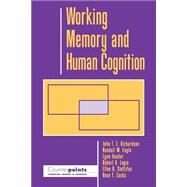Working Memory and Human Cognition
, by Richardson, John T. E.; Engle, Randall W.; Hasher, Lynn; Logie, Robert H.; Stoltzfus, Ellen R.; Zacks, Rose T.- ISBN: 9780195101003 | 0195101006
- Cover: Paperback
- Copyright: 5/16/1996
This new volume in the Counterpoints series compares and contrasts different conceptions of working memory, generally recognized as the mechanism within the human cognitive system that is responsible for the temporary storage and processing of information. This notion has been used in a wide variety of ways, partly because it encapsulates several themes that have appeared in the history of research into human memory and cognition. Consequently, variations in the usage of the term working memory also arise because it is invoked by theorists with different research agendas and perspectives. The book includes contributions from proponents of different views: Robert Logie discusses the existence of three different components that control temporary verbal storage, temporary visuo-spatial storage, and the central coordination of both processing and storage, including the retrieval of information from long-term memory. Ellen Stoltzfus, Lynn Hasher, and Rose Zacks focus on the inhibitory processes that control the entrance of information into working memory and update the contents by deleting information that is no longer relevant to the task at hand. Randall Engle argues that individual differences in working memory are tantamount to differences in the attentional resources needed to retrieve information from memory, and that these lead to differences in the ability to inhibit or suppress irrelevant information. Finally, editor John Richardson identifies the key issues that have divided researchers in this field and gives an integrated account of what has been discovered about working memory. As interest in working memory is increasing at a rapid pace, an open discussion of the central issues involved is both useful and timely. This work serves this purpose for cognitive psychologists and their students.







